- Home
- John Kendrick Bangs
Budd Boyd's Triumph; or, The Boy-Firm of Fox Island Page 3
Budd Boyd's Triumph; or, The Boy-Firm of Fox Island Read online
Page 3
CHAPTER III.--AGAINST WIND AND TIDE.
Not a great distance north of the farm of Mr. Benton, and stretchingsome distance along the shore of the bay, there is a singular formationof sand and rocks known as "The Hummocks." A small cove lies south andwest of the formation, while the main bay stretches out to its widestextent from the east. The only point, then, where "The Hummocks" touchthe main-land is at the north; and even this point of contact is sonarrow as to simply furnish a roadway down onto "The Hummocks"themselves.
Of these hummocks, for there are but two, the northern one is much thesmaller, embracing perhaps an acre of rough soil, covered with a stuntedgrass, and dotted here and there with red cedars. The southern one, onthe other hand, covered like its smaller mate with a scanty vegetationand scattered trees, broadens out so as to nearly land-lock the covebehind it, and causes its waters to rush in or out, according to thetide, through an exceedingly contracted passage-way at its extremesouthern end, popularly called "the narrows." The point of contact ofthe southern with the northern hummock, like the northern hummock withthe main-land, is also very narrow; and to its narrowness is addedanother feature: it is so low, or in more technical language it is sonearly on a level with the high-water mark, that when there happens tobe a strong wind from either the northeast or the southeast, the watersof the bay, on the incoming tide, will rush with great force over theslight barrier and mingle with the waters of the cove, making an island,for the time, of the larger and more southern hummock.
Perhaps half or three-quarters of a mile off shore, and a little to thenortheast of these hummocks, there is an island of an irregular shape,and a few acres in extent, that bears the name of Fox Island. The namehas belonged to it since Colonial days, but the reason therefor isunknown, unless at some remote period some solitary animal of thatspecific genus which gives the island its title may have there made itshome.
This island had in later years, however, a more illustrious if not lesssolitary inhabitant. A gentleman of some means, tired of society, orfor some reason at enmity with it, crossed over from the main-land,erected a small house, dug a well, set out trees, planted a garden, andbuilt a wharf--in fact set up thereon a complete habitation. Not long,however, did he endure his self-imposed solitude. Scarcely were hisarrangements completed when an unfortunate accident caused his death,and the island and its improvements were left to be the home of thesea-fowls or the temporary abode of some passing fisherman.
This extended description has been given here because it is essentialthat the reader should form some definite idea of the island and itsrelation to "The Hummocks," for on and about them no small portion ofour young hero's summer was destined to be spent.
Mr. Benton owned what is termed "a shore privilege" on the lower half ofthe southern hummock, and the peculiar situation of that rocky formationto the bay made it a valuable one, for heavy winds from any eastern orsouthern quarter brought onto the beach there immense quantities ofsea-weed, so highly prized by the farmer as a fertilizer.
During the fall and winter months previous to Budd's coming to the farm,owing to the repeated storms there had been landed on "The Hummocks" solarge and unusual an amount of this weed that Mr. Benton had contentedhimself with simply gathering it into a huge pile on the summit thereof,above high-water mark, intending to remove it to the farm in the spring.So it fell to Budd's lot to cart from the heap to the farm as the weedwas needed, and one day near the middle of May found him engaged in thiswork.
It was a cloudy, threatening day. The wind was from the southeast, andblew with a freshness that promised a severe storm before the day wasover. Perhaps it was on this account that Mr. Benton had directed thelad to engage in this particular work. He was himself obliged to be offon business, and this was a job at which Budd could work alone, and theweather was hardly propitious for any other undertaking. So immediatelyafter breakfast Budd yoked the oxen to the cart and started for hisfirst load.
"There ain't over four loads more down there, an' if ye work spry ye cangit it all up by nite," Mr. Benton shouted after him as he drove off.
The distance to "The Hummocks" from the farm was such that with theslow-walking oxen one load for each half-day had been regarded as asufficient task. But Budd knew he had an early start, and he determinedto do his best to bring all the weed home that day. He thereforequickened the pace of the oxen, and before nine o'clock had made hisfirst return to the farm. Unloading with haste, he immediately startedback for his second load. When he crossed from the north to the southhummock he noticed the incoming tide was nearly across the roadway, butthought little of it.
On examining the heap of weed, he became convinced that by loadingheavily he could carry what remained at two loads. He therefore pitchedaway until in his judgment half of the heap was upon his cart. It madea tremendous load; but the oxen were stout, and bending their necks tothe yoke, they at Budd's command started slowly off.
As he approached the narrow passage-way he noticed the tide had gainedrapidly, and was now sweeping over it with considerable force and depth.Jumping upon the tongue of the cart, he urged his oxen through thetossing waves. To his consternation the water came well up around theoxen's backs, and had he not quickly scrambled to the top of his load hewould have got thoroughly drenched.
The cattle, however, raised their noses as high as possible and plungedbravely through the flood, and soon emerged on the other side with theirload unharmed. The rest of the journey home was made withoutdifficulty, and Budd at dinner-time had the satisfaction of knowing thattwo-thirds of his appointed work was already accomplished.
Mr. Benton had not yet arrived home, and hurrying through dinner, thelad hastened off for his third and last load, hoping to get back to thefarm with it before his employer came. Hardly had he started, however,when it began to rain, and as he passed down onto the first hummock thewind was blowing with a velocity that made it almost impossible for theoxen to stand before it.
Slowly, however, the passage across the first hummock was made, and Buddapproached the narrow roadway leading to the other; then he stopped theoxen in sheer amazement. In front of him was a strip of surging andtossing water of uncertain depth, and he instinctively felt that therewas a grave risk in attempting to push through to the other side. Buthe was anxious to secure his load. He had passed through safely enoughbefore, and he resolved to attempt the crossing now, counting on nothingworse than a severe drenching.
This was a grave mistake, and Budd would have realized it had he onlystopped to think that there was quite a difference between his situationnow and when he had made his successful crossing before dinner. Then hehad a loaded cart, the wind and tide were both in his favor, and thewater had not reached either its present depth or expanse. Now his cartwas empty, a significant and important fact; the wind was blowing withgreater force and directly against him; while the tide, as he would haveseen had he watched it closely, had now turned, and was rushing backfrom the cove and out into the open bay with a strength almostirresistible.
But unmindful of these things, Budd bade his oxen go on; and though theyat first shrunk from entering the angry waters, he plied the stingingblows of the lash until they began the passage. For a rod they wentsteadily on, though the waves dashed over their backs and rushed intothe cart, wetting Budd to the knees. Then there came suddenly a hugebillow, rolling outward, that lifted the cart and oxen from the road-bedand swept them out into the bay.
Budd plied the stinging blows of the lash until suddenlya huge billow lifted the cart and oxen from the road-bed and swept theminto the bay.]
The moment Budd realized that the cart was afloat and the oxen wereswimming for their lives, his impulse was not to save himself, but theunfortunate beasts that through his rashness had been brought intodanger. Springing, therefore, between them, he caught hold of the yokewith one hand, and with the other wrenched out the iron pin thatfastened it to the tongue, and thus freed them from the cart. In theeffort, however, he lost his hold upon the yoke, and
the next minutefound himself left alone, struggling with the angry billows.
He was now forced to look out for himself, and could not watch the fateof the oxen, even had he had an inclination to do so. Indeed, with hiswater-soaked clothing, which greatly impeded his efforts, there wasalready a serious question whether he would be able to reach the shore,good swimmer though he was. With a strength born from the very sense ofthe danger that overwhelmed him he turned his face toward the fastreceding shore and swam manfully for it. For a time he seemed to begaining, but both wind and tide were against him, and his strength wassoon exhausted. Slowly he felt himself sinking. Already the waves weredashing over his head. He made one spasmodic effort to regain thesurface; then he had a faint consciousness of being caught by a hugebillow and hurled against some hard object, and all was blank.

 The Genial Idiot: His Views and Reviews
The Genial Idiot: His Views and Reviews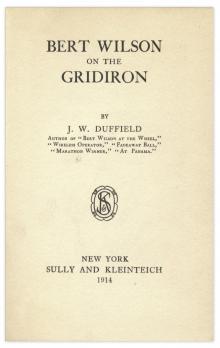 Bert Wilson, Marathon Winner
Bert Wilson, Marathon Winner The Enchanted Typewriter
The Enchanted Typewriter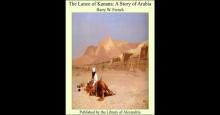 The Lance of Kanana: A Story of Arabia
The Lance of Kanana: A Story of Arabia Coffee and Repartee
Coffee and Repartee The Idiot at Home
The Idiot at Home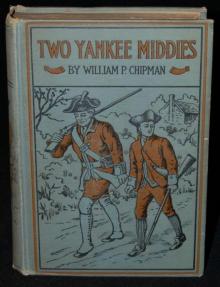 Budd Boyd's Triumph; or, The Boy-Firm of Fox Island
Budd Boyd's Triumph; or, The Boy-Firm of Fox Island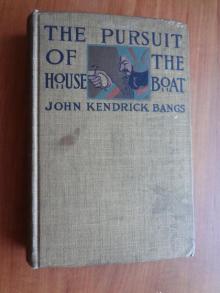 The Pursuit of the House-Boat
The Pursuit of the House-Boat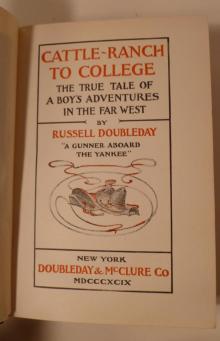 Cattle-Ranch to College
Cattle-Ranch to College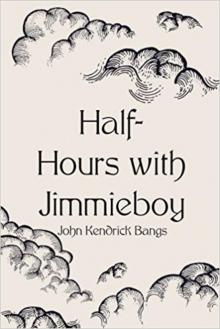 Half-Hours with Jimmieboy
Half-Hours with Jimmieboy Bikey the Skicycle and Other Tales of Jimmieboy
Bikey the Skicycle and Other Tales of Jimmieboy Toppleton's Client; Or, A Spirit in Exile
Toppleton's Client; Or, A Spirit in Exile Mollie and the Unwiseman
Mollie and the Unwiseman The Inventions of the Idiot
The Inventions of the Idiot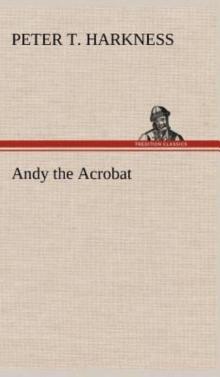 Andy the Acrobat
Andy the Acrobat In Camp With A Tin Soldier
In Camp With A Tin Soldier Angel over the Right Shoulder
Angel over the Right Shoulder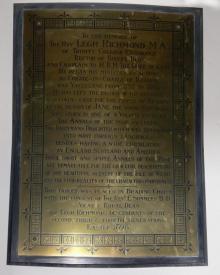 Annals of the Poor
Annals of the Poor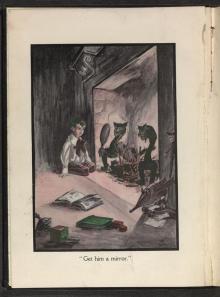 Andiron Tales
Andiron Tales Andy at Yale
Andy at Yale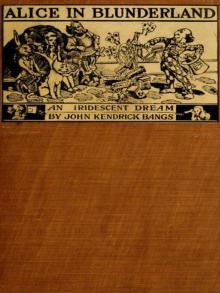 Alice In Blunderland
Alice In Blunderland